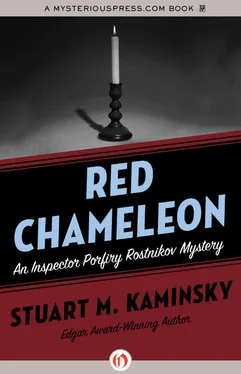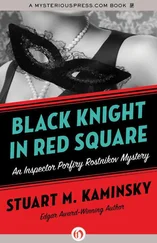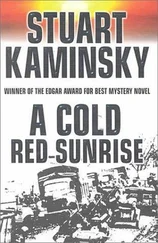Stuart Kaminsky - Red Chameleon
Здесь есть возможность читать онлайн «Stuart Kaminsky - Red Chameleon» весь текст электронной книги совершенно бесплатно (целиком полную версию без сокращений). В некоторых случаях можно слушать аудио, скачать через торрент в формате fb2 и присутствует краткое содержание. Год выпуска: 2012, ISBN: 2012, Издательство: MysteriousPress.com/Open Road, Жанр: Полицейский детектив, на английском языке. Описание произведения, (предисловие) а так же отзывы посетителей доступны на портале библиотеки ЛибКат.
- Название:Red Chameleon
- Автор:
- Издательство:MysteriousPress.com/Open Road
- Жанр:
- Год:2012
- ISBN:978-1-4532-6632-8
- Рейтинг книги:4 / 5. Голосов: 1
-
Избранное:Добавить в избранное
- Отзывы:
-
Ваша оценка:
- 80
- 1
- 2
- 3
- 4
- 5
Red Chameleon: краткое содержание, описание и аннотация
Предлагаем к чтению аннотацию, описание, краткое содержание или предисловие (зависит от того, что написал сам автор книги «Red Chameleon»). Если вы не нашли необходимую информацию о книге — напишите в комментариях, мы постараемся отыскать её.
Red Chameleon — читать онлайн бесплатно полную книгу (весь текст) целиком
Ниже представлен текст книги, разбитый по страницам. Система сохранения места последней прочитанной страницы, позволяет с удобством читать онлайн бесплатно книгу «Red Chameleon», без необходимости каждый раз заново искать на чём Вы остановились. Поставьте закладку, и сможете в любой момент перейти на страницу, на которой закончили чтение.
Интервал:
Закладка:
“Two questions, Comrade Karpo,” Rostnikov said with a sigh. “First, why would someone murder an old man and take only a brass candlestick.”
Karpo did not for an instant consider that Rostnikov’s question might be a joke. Karpo had no sense of what a joke might be. He knew that other people engaged in non sequiturs, incongruities, insults, physical misdemeanors, at which they laughed or smiled. He had never understood the process or function of comedy. And so he answered where others might have been wary.
“It is unlikely that the murder was committed for the candlestick,” Karpo said, looking straight ahead, “but that you know.”
Rostnikov nodded and kept drawing.
“Was the candlestick new, old, very old?”
“Very old,” Rostnikov said. “Perhaps a hundred years or more, but probably not an antique of any value, certainly not enough value for a well-dressed foreigner to covet.”
“Then,” concluded Karpo, “it could have been a trick, a ploy to lead us into thinking that it was important, to send us looking in the wrong direction, which would be very foolish and very clever at the same time.”
“Foolish?”
“Because,” said Karpo evenly, “we will pursue both the candlestick and the man. We will rely on no assumed link between the two but pursue both. We have the advantage of not tiring.”
Rostnikov looked at Karpo and the map of Moscow. Almost eight million people, the fourth largest city in the world, Moscow on the map looked like the cross-section of a log or tree stump, the rings of which tell its age-the Kremlin at the center, around it five rings, each historically marking where the city’s boundaries were centuries ago, on which were built wooden palisades, stone walls, and earthen ramparts. In those days it was only possible to enter Moscow through special gates built into the battlements.
The second ring, the Boulevard Ring, is lined with trees and is a band of lush green in the summer. The third ring, the Garden Ring, is the transport artery, sixteen kilometers around the center of the city. Farther out is the fourth ring, which two centuries ago served as the city’s customs boundary and on which now runs the Moscow Circular Railway. Finally, the fifth ring, a modern ring, the Moscow Circular Motor Road, marks the city’s present boundary.
“I get very tired, comrade,” Rostnikov said.
“Individually, yes,” Karpo responded seriously. “But we are not individuals alone. We are part of a determined whole.”
“Which,” said Rostnikov, putting his pencil down and turning awkwardly to face his pale subordinate, “brings me to my second question. When will you admit that your arm is no longer capable of function? When will you let it be examined by a competent doctor?”
As long as Karpo had known Rostnikov, almost fifteen years, he had frequently been lulled by the man’s manner into making mistakes. Karpo vowed to himself each time to be more careful, but he also took pride in his superior’s ability to penetrate, to trick sympathetically. If the individual was not so important, why did Karpo not admit his handicap and step down for a more able investigator? Was not the loss of the use of an arm sufficient cause to step down, to recognize that there could well be situations with which one could not cope?
“Perhaps never,” Karpo said, unblinking eyes fixed on his superior.
Rostnikov rose with a sigh, holding the table with his right hand till he could straighten his left leg under him.
“Never?”
“When I catch the Weeper, perhaps,” Karpo amended. The amendment was necessary. Karpo lived by reason and dedication. It was only reasonable to come to this conclusion.
“You don’t have to retire even if you discover you have one arm,” Rostnikov said, shaking his head. “I have, in effect, only one leg, and the Gray Wolfhound has but half a brain.”
“I do not wish to be a detriment to-”
“Ha,” Rostnikov interrupted in mock exasperation. “With one arm you are the best man in the procuracy. See, now you have forced me to embarrass both you and myself by extending flattery. You keep on like this, and I will soon be cordial, then polite, and we will find ourselves in a situation in which we are like that pink panda who just shambled out of here.”
Karpo rose and nodded in agreement. “I will take your suggestion under advisement,” Karpo said.
“The Weeper,” Rostnikov said, holding back a morning yawn.
“The Weeper may return to any of those hotel roofs,” Karpo said softly.
“He appears to be a creature of habit,” Rostnikov prodded.
Karpo nodded and went on. “The attacks are coming more frequently. I believe the Weeper is on some time schedule, some constraint. I believe the Weeper is no longer shooting randomly but that Sergeant Petrov was an intended victim. I’ve examined the reports of the incidents, spoke to those who were nearby. For every attack there was at least one nearby witness in uniform, military or police. The Weeper has simply grown confident or angry enough to fire at the real intended victims.”
“And you conclude from this?” Rostnikov said with a small smile.
“That another attack will take place soon where people in uniform can be readily found.”
“That could be-”
“Many places,” said Karpo. “I am well aware of that. I would like to post men who would be well hidden atop the high buildings facing military establishments within Moscow and perhaps a man atop the Destky Mir children’s shop across from KGB headquarters. And, of course, atop this building.”
Rostnikov pocketed his doodles, shook his head, and smiled. “You have no evidence,” he said. “This is all concoction.”
“I remind the chief inspector that in the past I-”
“-have been right about such things,” Rostnikov finished. Karpo’s statement about his own record had been given without ego. He spoke not out of pride but confidence, a willingness to pursue. He might turn out to be quite wrong, but Rostnikov knew that Karpo would not mind, that he would simply formulate another theory, and another and another, and pursue until he caught the Weeper or someone else did so.
“You will have your men atop buildings, but I cannot take responsibility for placing anyone across from KGB headquarters,” Rostnikov said, reaching for the door. “It would be difficult to explain why we had not informed the KGB about our plan if we were caught. No, the KGB will have to rely on its reputation. Besides, they are more expendable than we are. There are so many more of them.”
Karpo gave no sign that he recognized irony in the Washtub’s words or manner. He simply nodded in agreement and moved to follow Rostnikov out of the now-open door.
“One final thing,” the Washtub said. “Why do you think the Weeper might be a woman?”
“I didn’t say-” Karpo began.
“You carefully avoided gender in describing the Weeper. I conclude-”
“The Weeper may be a man or woman,” said Karpo. “It might have been a man weeping in a high voice or a woman.”
They were standing in the hall now near a window open to let in some touch of air in the summer heat. The moist taste of coming rain prickled Rostnikov’s cheek and gave him a curious satisfaction. The sound of barking German shepherd dogs in the police kennels below the window gave a faraway sense of melancholy to the scene.
“Emil,” Rostnikov said, walking at the side of the taller, gaunt man whose limp left arm was plunged into the black sling under his jacket, “have you ever read The Adventures of Huckleberry Finn ?”
“No,” said Karpo as they stepped aside to let a uniformed young man carrying a stack of files hurry past them. “Should I?”
“There is a passage in which the drifting young boy hears the faraway sound of someone chopping wood,” Rostnikov said. “The sound of something far away, the echo of each plunge of the ax blade into the wood. It is a passage of great beauty, Emil. It is a passage which vibrates like a summer day in Moscow.”
Читать дальшеИнтервал:
Закладка:
Похожие книги на «Red Chameleon»
Представляем Вашему вниманию похожие книги на «Red Chameleon» списком для выбора. Мы отобрали схожую по названию и смыслу литературу в надежде предоставить читателям больше вариантов отыскать новые, интересные, ещё непрочитанные произведения.
Обсуждение, отзывы о книге «Red Chameleon» и просто собственные мнения читателей. Оставьте ваши комментарии, напишите, что Вы думаете о произведении, его смысле или главных героях. Укажите что конкретно понравилось, а что нет, и почему Вы так считаете.












